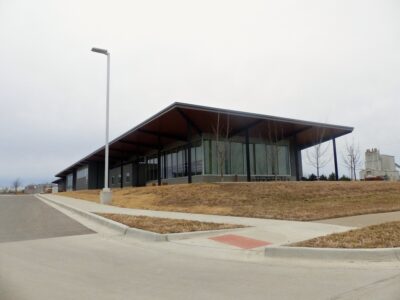Haskell professor launches Center for Justice, proposes renovating long-dormant building to house it

photo by: Lauren Fox
Haskell Indian Nations University professor Daniel Wildcat is pictured on campus outside of Hiawatha Hall on March 10.
Haskell Indian Nations University professor Daniel Wildcat has been an advocate for over two decades for restoring one of the campus’ central buildings, and now he wants to tie it to another project: a place to discuss justice.
The building is Hiawatha Hall, a structure built in 1898 that used to serve a variety of functions — chapel space, a gym for female students, a location for theater performances. But for over 20 years, Wildcat estimates, the building has sat dormant and in disrepair. Wildcat said the idea to use the building as a place to discuss justice issues “just kind of hit me like a thunderbolt” while he was thinking about events and tensions of the past year, such as the COVID-19 pandemic, the Black Lives Matter movement and the nation’s stark political divisions.
“I think right now the most important issues any of us are facing are about justice. What isn’t about justice, really? And I thought, you know, this is something I really need to get started,” Wildcat said.
It might be a while before the building itself could be renovated. But Wildcat has already started thinking of ways to provide a forum about justice issues on campus, and his project — operating as The Hiawatha Center for Justice — has already held a virtual event.
Wildcat said he wrote a proposal in the summer and got the approval of Haskell President Ronald Graham to work on developing the center. By the fall, Wildcat had partnered with Andrew Williams, the associate dean for diversity, equity, and inclusion at the University of Kansas School of Engineering. Williams is also the director of KU’s IHAWKe group, which stands for Indigenous, Hispanic, African-American, Women, KU Engineering.
Like Wildcat, Williams knew he wanted to do work surrounding justice and equity after the death of George Floyd at the hands of the Minneapolis police. Once he heard about Wildcat’s idea to renovate Hiawatha Hall into a Center for Justice, Williams asked Wildcat if the IHAWKe students could generate ideas for it. Haskell students were also able to participate.
“Part of IHAWKe’s vision is to help diverse students understand how they use engineering to change the world,” Williams said.
Wildcat loved the idea of getting students involved. In the fall, they came up with ideas on how to renovate the hall using their mechanical engineering, architectural and data science skills and more.
“They looked at not only renovating or repurposing Hiawatha Hall physically, but also how they could facilitate virtual collaboration,” Williams said.
Some students came up with the idea that people could tour the building using virtual reality goggles, and others developed prototypes for an AI chatbot that would answer questions related to exhibits at the center.
There are some obstacles to actually turning the building into a physical Center for Justice, however. Wildcat said architects came to look at Hiawatha Hall a few years ago and estimated it would need $16 million or $17 million in renovations. Currently, there is $1.5 million allocated toward Hiawatha Hall in the budget for the Bureau of Indian Affairs, Wildcat said; he urged anyone interested in supporting the building’s renovation to contact the Haskell Foundation.
For now, virtual programming is what Wildcat is going for. The Hiawatha Center for Justice hosted its first virtual event, about the Black experience in America, in February. Wildcat said he hoped to continue hosting events on a regular basis, possibly every other month.
“I understand this is a big initiative, but I think the important thing is to get it started,” Wildcat said. “I’m just thinking that if you have got a good idea and you can show people the kind of work you want to accomplish, then people are going to want to invest. And so that is really what I’m going to promote this next year.”
Hiawatha Hall is named after Hiawatha, who was a member of the Onondaga tribe, one of five warring tribes of the Iroquois Nation. According to the Lowell Milken Center for Unsung Heroes in Fort Scott, Hiawatha was instrumental in helping unite the five tribes into the Iroquois Confederacy. The Iroquois Confederacy then drafted a constitution known as the “Great Law of Peace,” which is said to have inspired articles in the U.S. Constitution.
Hiawatha was all about justice and peace, Wildcat said, making Hiawatha Hall the ideal location for a Center for Justice. In a piece for Media Voices Quarterly, Wildcat wrote that the current state of Hiawatha Hall “serves as a sad symbol of the neglect of the ideals of peace, justice and responsibility its namesake promoted.”
He continued, “It is clear the time has come for Hiawatha Hall to undergo a major physical renovation and a spiritual rejuvenation befitting its namesake.”







COMMENTS